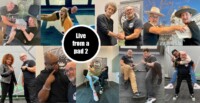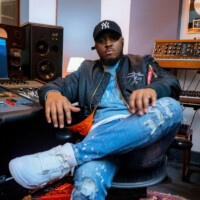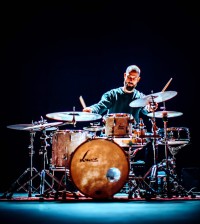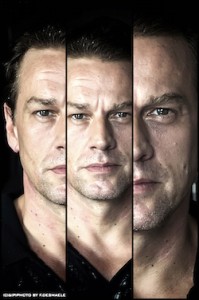 I remember very clearly standing in the front row at the Music Messe in Frankfurt as a little boy, absolutely mesmerised by the flying hands and feet of Thomas Lang. The speed, precision and independence was simply mind-blowing. But there is much more to Thomas Lang than just the ‘Drum-inator’ we know from his solo shows.
I remember very clearly standing in the front row at the Music Messe in Frankfurt as a little boy, absolutely mesmerised by the flying hands and feet of Thomas Lang. The speed, precision and independence was simply mind-blowing. But there is much more to Thomas Lang than just the ‘Drum-inator’ we know from his solo shows.
From his earliest musical days growing up in the classical environment of Austria, Lang acquired an impressive mindset on practising which quickly got him to the top of his game and onto the drum chair of Austrian pop legend Falco.
Over the next few decades Thomas’ journey took him over a 10 year detour in London to his now residence of choice, Los Angeles, playing for some of the biggest names in the music industry. Robbie Williams, Peter Gabriel, Kelly Clarkson, Tina Turner, Kylie Minogue, Ronan Keating and Stork are just a few artists to mention.
Today he runs two recording studios, works as a composer, producer, tutor and drum gear designer while still doing countless of recording sessions, touring, clinics and drum camps.
I met up with Thomas at a clinic in London, in the midst of his world tour with Paul Gilbert, to chat about his upbringing, his work away from the drum chair and about the Thomas Lang Universe, his brand new online drum school.
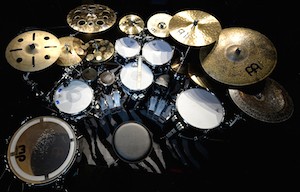 You started off because the drummer “looked like the one in charge”?
You started off because the drummer “looked like the one in charge”?
Yes, I saw a band on a TV show and just got caught on the drummer. He was the only one sitting down, everybody else had to stand up; he seemed like an authority on stage because he was counting off the songs and everybody else was looking at him for that reference; he started every song with a big drum fill before the others joined in – he seemed to be in charge, he’s the boss commanding everybody around. Simply because of that the drums were on my radar. About a week later I happened to be at a local kind of fairground event (Feuerwehrfest) and there was a live band playing. I walked up to the drum set straight away held onto the bass drum hoop while the guy was playing. Feeling that air pressure, the sound and the volume just blew me away.
Most of your education, at least in the early stages, were from a classical conservatoire. How do you think this influenced your musical upbringing?
It was a massive influence. I learned to deal with a lot of pressure, my teachers were very authoritarian, there was constant pressure not to proceed to the next term and not pass your regular auditions. You really had to keep up and stay on top of your homework. It was a very high pressure situation and I think it taught me to stay cool under pressure and operate well in that kind of environment. It also taught me very early on not to get nervous and to focus on the important things like myself, what I’m doing and the music rather than the audience or circumstances. It also effected the way I think about music. For example I have a very classical approach in the sense that I look at ‘many notes’ as ‘ties’ or ‘long notes’ rather fast bursts of 32nd notes or something like that. I think that’s quite profoundly different to what most other drummers do.
 Did this ‘more serious’ environment make you pick up any special practise tricks?
Did this ‘more serious’ environment make you pick up any special practise tricks?
Hundreds. I started with my first snare drum book: Richard Hochrainers Kleine Trommelschule. It was a very famous Viennese classical snare drum book and at the bottom of every page there’s a practise rule written down. My first teacher was fantastic because he taught me how to practise before he taught me how to play. We spent the first few weeks on just that. Most musicians never learn how to practise methodically, with results in mind and in a goal orientated way. He told me how to do that from day one which I think made a huge difference in my practising and playing career in life. I learned to practise very efficiently and methodically in a very organised and planned manner. I was able to play my practise ahead, I always kept track on how long it took to develop new things so I could project into the future how long new things would take to develop and so on. I had practise plans and spreadsheets with exact amount of times and how to divide your time pre practise session. It was a very methodical approach and I think that was all a result of studying with classical musicians.
You started off as a session drummer, which you’re obviously still doing, but what made you branch out into the clinic side of things?
I played as a sideman touring and session musician for a couple of decades but in 2000 a few things came together: I changed cymbal companies to Meinl, I helped develop a pedal with Sonor and I re-released an instructional video. Because I was doing all this my sponsors asked me to do some clinics to promote the new products. This all coincided with a friend of mine in Austria, Gerhard Jessel, having a Millennium Drum Fest which he invited me to play because he wanted an Austrian drummer there too. I decided to do a clinic type solo performance there which got covered in the press a lot. That kind of got the whole ball rolling on the clinics. I always refused and avoided doing them before because I didn’t really like the idea but after doing a few I saw the interesting aspects of it, musically, in terms of my personal development as well as in a business sense. I decided to do more and did a massive worldwide clinic tour in 2004 when I released a video with Hudson music. It was something like 220 clinics on top of 100 shows I did with various artists that year too.
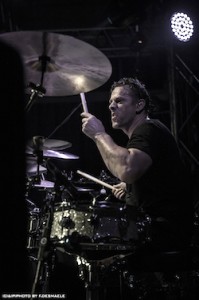 Let’s talk about the new Thomas Lang Drum Universe?
Let’s talk about the new Thomas Lang Drum Universe?
Yes, it’s my brand new online drum school. I recorded a brand new curriculum over the last year and compiled close to 500 exercises and lessons so far which are all uploaded on the site. It’s a subscription based model, so once you sign up to a annual subscription you can log on and consume anything you want on there. There are hundreds of exercises, there are free play-along tracks with different mixes, free downloadable music, all the unreleased stuff I wrote, free albums of my bands and pdf files of transcriptions of course. It’s all interactive so people can contact me, send me videos through the forum, message me and get ahold of me personally anytime anywhere. I can answer the questions or reply with videos. It’s a lot of work but it’s really fun and a great way for me to reach people that I couldn’t reach with my boot camps, the big drum bonanza or the other things I do because they’re in such remote places that they don’t have any access to great teachers. This way they can find the information they desire and need.
You’ve mentioned curriculum already. Is it kind of linking in with your previous DVD’s and books?
No. Well certain things will: a paradiddle is a paradiddle – and I do cover a lot of rudimental stuff but there is a lot of new stuff and it’s organised in a very interesting way I think. So yeah, except for the sort of traditional drumming information everybody needs, it’s all radically new. There’s a lot of cutting edge stuff: a lot of independent exercises, a lot of interdependent exercises, linear, non-linear, dynamic coordination exercises, a lot of explanation on polymetrics, and also there’s big sections of opinions, advice and conversations where I talk about everything that’s drum, music or career related. How to prepare for a tour, how to prepare for a session. From tuning to unboxing new pedals, trying new gear, tour blogs and so on. I try to provide as much behind the scene information as possible. People get to watch me record tracks, transcribe music, prepare for a tour or session and much more. I think it’s a plethora of drumming information and inspiration, hopefully.
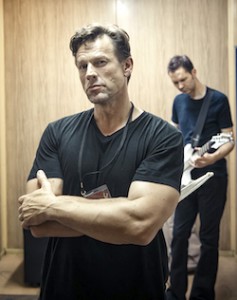 Has teaching always been such a passion of yours?
Has teaching always been such a passion of yours?
Yes, I love it. For me it’s very gratifying and wonderful to see that it can actually make a difference in peoples life, more so than performing with a band or touring. I’ve reached people on a very different level through teaching and inspired them to literally change their lives for the better. I have many examples of people who over the years have struggled in their jobs or schools to do or study something they don’t really want because the pressure from their environment (or parents) was so tough. I think I was able to give them confidence in their own playing and skill level to pursue this professionally and inspire a ‘I don’t give a f**k’ in them and make them pursue their passion and dream rather than do something just to please somebody around them. I know a lot of people who have literally changed their lives. Not only are they now doing what they’ve always wanted to do but they’ve met the woman/wife they were always dreaming of and were able to create an environment for themselves and their kids that they really love.
Drumming has partially become a little bit of an “extreme sport”. Some young drummers seem to try and get their heroes speed and crazy ostinati down before learning the basics, without knowing that people like you or Jojo have done that groundwork years ago. Do you have any advice for young drummers to find a balance?
You know, I think whatever it is that inspires somebody to pick up drumsticks and start drumming in the first place or dig deeper into drumming from wherever they are – whatever it is that inspires them is good. If it’s extreme drumming that inspires them, or the World Championship drumming with the Drumometer (which obviously is nothing musical or creative, it’s literally considered a sport), whether it is extreme drumming or simple drumming – it might be Meg White from the White Stripes or Lars Ulrich, they’re maybe not the best drummers in the world but they inspire legends of young drummers – I think it’s all good. Eventually anybody who really feels the passion and enjoys playing music will discover nuance, creativity and emotion throughout the process. It doesn’t matter how you enter playing music it just matters what you do with it once you discover meaning and your passion with it.
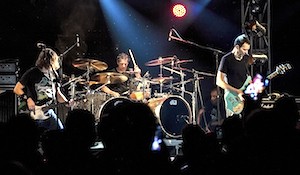 Let’s talk about your switch from traditional to matched grip. Amongst the very technical drummers you kind of used to be the last ambassadors of it.
Let’s talk about your switch from traditional to matched grip. Amongst the very technical drummers you kind of used to be the last ambassadors of it.
It’s been a few years since the switch now. I still play traditional sometimes in drumming situations like this just to show both grips and sometimes I fall back to that grip out of laziness and comfort. I don’t ever do it when I work but I do it in clinics just do show a different style and sound. The reason why I switched was because I was in my comfort zone too much with traditional grip and I wanted to get out of it and challenge myself. I felt very comfortable with the grip and my technical ability with it and that just made it boring for me. It made me repeat myself in a way, I didn’t like the way I sounded and I hated the way it looked. In the beginning I actually loved the way it looked. I thought it was very charming, nostalgic and a tribute to the drumming tradition, history, Buddy Rich, the marching tradition and the asymmetry of it but towards the end I just hated it. I also had issues with carpal tunnel syndrome and stuff like that so I wasn’t sure if that was a contributing factor. Traditional grip just is a crutch, it requires so much maintenance and constant warming up. It was just too time consuming and paranoia attached to it. With matched grip I never warm up, I never practise and I can play everything I always played with traditional grip without ever doing anything. It’s just so much easier.
Another good point: you didn’t warm up before the clinic tonight?
No, of course not, I never warm up. I don’t think that’s a great thing, I’m sure it doesn’t work for everybody and even I feel different and play differently if I warm up but I don’t think I need warming up: not psychologically, not physically and I absolutely don’t think my carpal tunnel is a result of not warming up my whole career. For me the reasons for not warming up are just stronger than the reasons for it.
The effect it has on me is minimal. If I play paradiddles and paradiddle diddles on a pad backstage and then go on stage and whack the shit out of the drums for two hours is a very different process and warming up on a pad doesn’t do anything for that.
The second reason is that it takes away that anticipation for me, the ‘looking forward to playing’. If I’m already playing backstage, even if it’s on a pad, I don’t get the same kind of kick out of going on stage where my drums and sticks are and playing music. It takes away that excitement for me. I just hate sitting there doing some technical exercise and then go and play music with a band. I want to not play, let the excitement and anticipation build up and then go on stage and go for it.
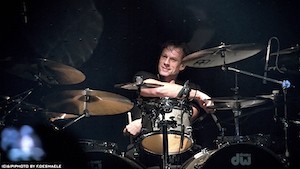 What’s happening playing-wise at the moment? I’m just catching you in the midst of the Paul Gilbert tour.
What’s happening playing-wise at the moment? I’m just catching you in the midst of the Paul Gilbert tour.
Yes, we’ve been on the road for two months and have a few weeks left this year. We did Asia, Europe and in January we continue with the US and South America, so it’s a world tour to promote the new album. I’m very busy in my two studios in Los Angeles where I do a lot of recording sessions and remote sessions. Especially when I’m on the road I get a lot of music sent that I then have to record when I’m back, so I’m loaded with work as soon as I’m back. After the touring with Paul next year I have a lot of recording sessions booked, I’ve got some camps booked and I’m working on my online school where. I have sign ups every day,I’m adding to the curriculum every month and upload all kinds of stuff. Even when I’m travelling I record all the time and upload behind the scenes stuff. And I’m writing and producing. I’m working on a new album with Page Hamilton from Helmet, I’m working on a new album with a singer named Ginny Luke, I’m working with several people in Japan, we’re doing a new album with Spark 7, I work on a new record with Isao Fujita from Babymetal, it goes on and on… very busy.
You do a lot for work besides drumming then?
I do, I work a lot in the music industry. I’m very active as a producer and writer of music, I do a lot of teaching online, I do about 10-15 Thomas Lang Bootcamps a year, I do the Big Drum Bonanza (which is a big drum camp/festival in Los Angeles, I do video editing, I’m a webmaster, sound engineer, drum tech, I design a lot of drum equipment (just released a new kick pad, working on some new cymbals) and so on….
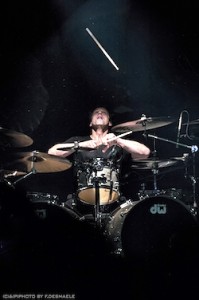 Is that the key to success in the music industry?
Is that the key to success in the music industry?
To wear many hats? Yes of course, you have to keep many balls rolling and be good at everything all the time. If you want to be successful you have to do everything yourself; unless of course you have great competent people you can trust but those are hard to find and usually very expensive. So if you want to get the business started it helps to do everything or at least be interested in everything so you can contribute.
We spent a few hours this afternoon building you a Frankenstein-Monster-Kit for your clinic tonight and Mike said: “Thomas is in a candy store”. After all these years of drumming how are you still so passionate about all this?
I’m a gear nerd, just like everybody else. I love drums! Especially really sexy drums and good sounding drums. I don’t need huge drum sets or anything, actually the huge kit today was very uncomfortable. It had a lot of stuff on it I really didn’t need or want. Especially being in the middle of a rock tour at the moment my mind is not freakily Timbalitos or stuff like that. I know that in a situation like this the drum-porn is more for everybody else than for me. It’s always like that in these clinic situations or drum festivals. I don’t set up all this stuff to please myself but for the audience. It’s show business. I set up a whole bunch of weird stuff and play weird things that hopefully people find interesting, intriguing, creative and inspiring. To please myself I’d set up a 3-piece kit: kick, snare, hi hat. That pleases me. To me it’s not about the quantity but the quality of the sound and the tuning of the drum. A 3-piece or 5-piece kit that sounds great is all I need. My larger drum sets at home are set up that way because I need all those sounds for the recordings that I do. I have one kit in the studio that’s always mic’d that just has everything on it. I can do rock with it, I can do progressive with it, I can play fusion, funk and whatever. I can do all these things with just the one kit, that’s the only reason it’s fairly large.
Thanks a lot for your time Thomas!
Tobias Miorin
December 2016

